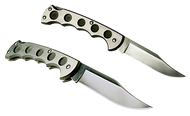Knife Laws and Legislation in the United States
Posted by American Edge on Mar 24th 2020
The laws that govern how a person can carry, purchase, or own a knife are varied throughout the United States. It can be tough to understand what is legal and what is illegal, especially as the laws change from state to state and even city to city.
These laws change fairly often, so it is worth your while to stay current on your city’s exact regulations, but the overall breakdown of each law falls within two categories: ownership and carry and concealment.
Knife Ownership Laws
Ownership laws determine which knives are available to be bought, sold, and owned throughout an area. Many varieties of knives that are restricted have a negative connotation associated with them, usually based on their reputation. In some states, knives might be limited on their blade length (for instance, California limits automatic knives with blades that are greater than 2 inches) or the age of the owner. Others might limit ownership to those with special permits.
Carry and Conceal Laws
Aside from ownership, some states have separate laws in place to determine how a person can or cannot carry or conceal a knife. Often, conceal regulations might accompany a person’s hunting or gun ownership permit, or they might be limited to people over the age of 18 or 21. These laws usually form around knives that are incorrectly perceived as scary or more dangerous, such as gravity knives, automatic knives, or Balisongs. These restrictions are usually based around the antiquated idea that a knife has no purpose other than to be used as a weapon instead of the fact that they are useful tools that many law abiding citizens rely on in their everyday lives. As a general common sense rule of thumb, if you are not doing anything wrong you don’t have anything to be worried about.
What about Federal Law? Does that Overrule State Laws?
Short answer: no. In a nutshell, federalism dictates that the United States might have laws on a national level that differ from those at a State level. For Knife law, the only federal law in place currently is the Switchblade Knife Act of 1958, the act regulates the manufacture and introducing of switchblades into interstate (crossing state lines) commerce. It has NO application to individual consumers, or most merchants who sell knives. It has NO application to laws WITHIN a state. For all other regulations on the possession, use, sale, etc. of these knives, each state regulates based on their own rules.
For example in Minnesota (where we are located), state law says that automatic knives are illegal to manufacture, carry, or possess. Here at American Edge we still have these knives available for sale to law enforcement, military and other permitted people of the federal and state governments. This is made possible by the provisions that we are considered procurement officers and bonafide dealers. Switchblade knives are legal in 40 states at the time of this writing and we will also ship to these states.
Many knife laws are based on a knife’s mechanism, blade length, or classification. For the most part, pocket knives, hunting knives, utility knives, Leatherman’s, and multi tools – especially when a blade is less than 3 inches in length – won’t have any city, state or federal regulations attached. Again, knife laws will vary from area to area and change often, so staying informed on the latest laws is important to collectors, enthusiasts, and outdoorsman a like.
We recommend checking out https://www.akti.org and https://kniferights.org for up to date laws and regulations around the country and for current legislation that is before federal and state legislators. We are in strong support of the work these organizations are doing to protect and advance knife rights for citizens across the country.


